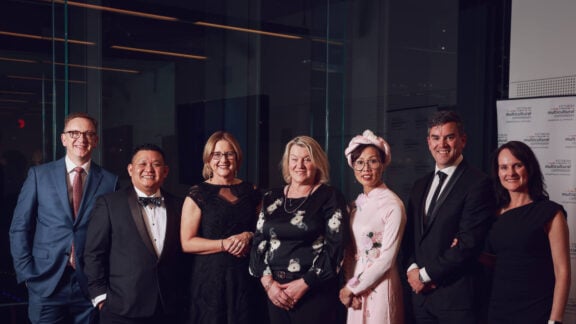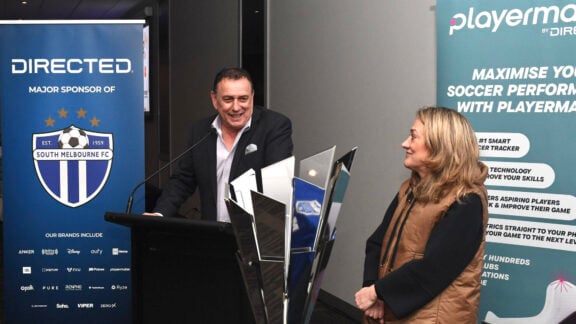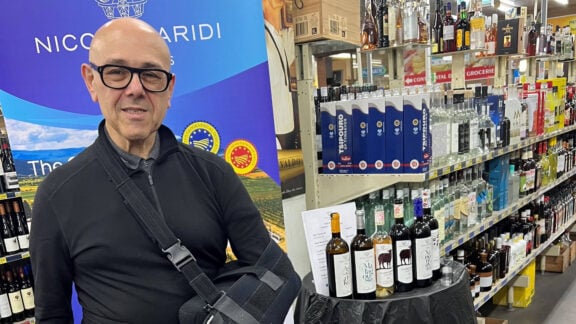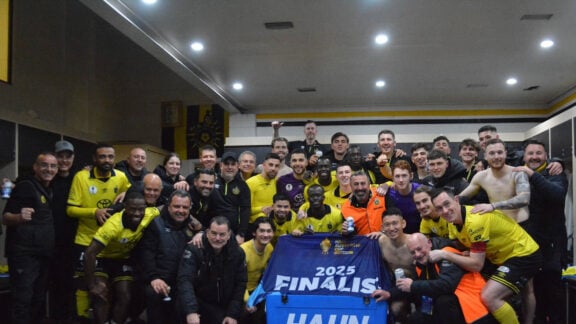In the heart of Melbourne, where the pulse of the Arts beats strongest, 23-year-old Greek-Australian theatre director Daphne Gerolymou-Papadopoulou and her colleague Sophia Derkenne are sparking deep conversations with their unique performance ‘Breadwinning’, currently being showcased at Testing Grounds and running until August 11.
Graduating two years ago from the Victorian College of the Arts, Daphne’s passion for theatre and live performances found an exciting outlet in this interactive work that explores life’s big questions through the metaphor of bread.
‘Breadwinning’ offers a unique and engaging theatrical experience that encourages the audience to reflect on values and current social systems as well as the power of collective action and the importance of simple acts of care in building a more connected and aware society.
THE JOURNEY TO ‘BREADWINNING’
Daphne’s journey into theatrical creation stems from her love for performance and live art. “I always loved acting,” she tells Neos Kosmos. “The courses at university piqued my interest and ignited my passion to create my own work.”
The idea for ‘Breadwinning’ was born from her collaboration with Sophia Derkenne.
“Sophia had come up with the idea for this play and reached out to me,” Daphne explains.
“We both attended the same university, so I knew her and was very interested in the project.”
Initially, the play focused on the need for care and the work environment in today’s society.
“We explored the idea of care through simple acts, such as preparing and sharing food,” Daphne elaborates.
“These acts, though undervalued in our capitalist structures, are essential for connecting people with one another.”
THE POWER OF INTERACTION
Creating ‘Breadwinning’ presented numerous challenges, particularly regarding its interactive nature. “Interactive theatre relies heavily on audience participation,” notes Daphne.
“A lot of time was spent theorising and hypothesising about how things would unfold and what people would do.”
The interactive element of ‘Breadwinning’ sets it apart from traditional theatre. By engaging the audience, the performance creates a dynamic and engaging environment that encourages active participation and reflection.
“What happens on stage is that we, along with a small group of no more than 20 spectators, engage in competitive games and missions,” Daphne describes.
“We pretend to be top breadwinners, and the idea is that you come to this club to learn how to become top breadwinners too. There’s a game element, and at the end, we share the bread.”
This approach is designed to provoke discussions and encourage collective reflection on current social values and systems.
“Change is interactive and requires collective efforts,” Daphne stressed.
“We don’t have the answers, but by raising these questions and concerns, we hope to spark conversations about how we can change our current systems to better reflect our attitudes and values.”
POSITIVE AUDIENCE RECEPTION
The show has already begun, and audience reactions to the interactive nature of the play have been overwhelmingly positive.
“We’ve received wonderful feedback,” Daphne shares.
“People are having a lot of fun playing these games and experiencing different moments within the performance.”
This response highlights the power of interactive theatre to engage audiences in meaningful ways.
“By breaking down the traditional boundaries between performers and spectators, ‘Breadwinning’ creates a space for shared experiences and collective reflection,” says Daphne.

THE ROLE OF BREAD IN ‘BREADWINNING’
Bread, as a universal symbol, plays a central role in the performance.
“Rather than using a specific type of bread, we rely on the concept of bread-making to explore ideas around work culture, hustle culture, capitalism, community, and care,” Daphne explains.
“Simple acts of care, like baking and sharing bread, are undervalued because they don’t generate capital profit, but they are crucial for human connection.”
This focus on bread allows the performance to resonate with audiences from different cultural backgrounds.
“Bread-making is vital in all cultures,” the young theatre director notes.
“Everyone has their own stories about bread, about how they share bread during meals. It’s something everyone can relate to within their cultural context.”
GRANDMOTHER’S LAGANA
For Daphne, the performance is deeply personal. As the granddaughter of a baker, her connection to bread is rooted in family traditions and memories.
“I decided to make lagana to offer to the audience because I have many vivid memories of my grandmother making it,” she reveals.
“Breaking the bread with our hands and sharing it among us is closely linked to my family, and I wanted to offer that to our audience.”
FUTURE AMBITIONS
As ‘Breadwinning’ continues its run, Daphne and Sophia look forward to analysing their experiences from this theatrical venture and planning for the future.
“We’ll see how things go and then think about what we’ve learned and where we can go from here,” Daphne says.
She has a clear vision for her near artistic future.
“I plan to continue exploring interactive theatre,” she states.
“It can be a really fun form of work, and I hope people give it a chance. It’s challenging, but very rewarding,” concludes the young and promising theatre creator.
‘BREADWINNING’ AIMS TO SPARK CONVERSATION
‘Breadwinning’ is not just a performance but a call for collective reflection and action. Through the simple yet profound act of breaking and sharing a lagana, Daphne Gerolymou-Papadopoulou and Sophia Derkenne invite the audience to engage in meaningful discussions about care, community, and change.
As Daphne says, “We don’t have the answers, but maybe, through these discussions, we can find them together.”
The performance will continue at Testing Grounds (450 Queen Street, Melbourne) until August 11.









